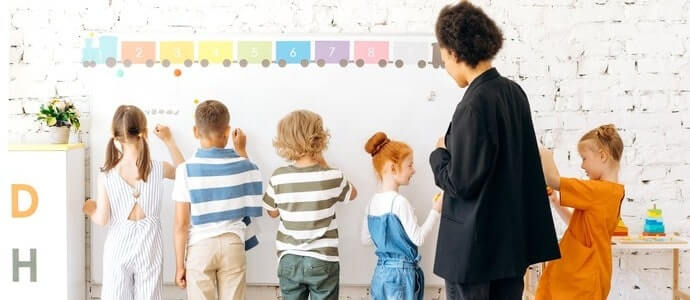Best Strategies To Get Kindergarten Students To Listen
Kindergarteners must have good listening skills

Look at as many students as possible when giving commands. Ask students to turn their ears (or eyes) on. Hold your hand up to your eye or ear, and have them mimic it. Call any student by name that is not following. Kindergarteners can probably not multitask, especially verbal orders. You have to keep your commands short and simple. You can break multiple steps into little ones.
Getting a class of kindergarteners to repeat back some commands is a great trick! Remember, kindergarteners are little children. They may need to be told more than once what they are expected to do.
Use language that a kindergartener can readily understand. This does not mean dumbing it down. It means your commands and directions should be easily understood by every child in the classroom.
You want to model good behavior, and this includes directions and commands. "Please" is a good word, even for teachers. If you, the teacher, want them to do something, using "I want" can be effective as well. "I want you all to please...."
As a kindergartener you are teaching them a little reading. So, writing some instructions on the board for all to see and say can help. For example, short commands like "clean up," "chairs up," "pencils down," "walk," "eyes up here," are just a few.
Please don't yell. With a room full of noisy kindergarteners, you may feel the need to raise your voice. Don't do it. Instead of yelling, have an attention cue that you use that will always signal that everyone is to be quiet and look at you.
Holding your finger to your mouth, ringing a bell, are just two examples. Normally counting does not work for children. They will hold out for the last number. What is the last number? A better idea with kindergarteners is to start saying a rhyme or singing a song that all the children know. They will actually eagerly chime in and follow along. End the song, you are ready for the next task. You will actually train them over time, so don't expect it to go perfectly on day one.
Kindergarteners are people too. So, they like to be told or forewarned of what is to come next. So let them know what's coming. Something like, "A few more minutes and clean up is coming." You will need to decide what "time" intervals they comprehend.
Praise them. Always and often. Praise them for good jobs and following directions. Praise them for trying. Kindergarteners do not need to be punished (mostly) in school. They need to be encouraged, nurtured, and loved. They will perform better when they know you like what they are doing.
Common Problems of Kindergarten - Effective ways of dealing with the top problems in a kindergarten classroom.
The Kindergarten Classroom - What makes a good kindergarten teacher?
What to tell parents - Parents of kindergarteners have questions. Do you have the answers?
How to get kindergarteners to listen - Kindergarteners are active and it can be difficult to get them to really pay attention to a teacher.
Making Kindergarteners Future Learners - Kindergarten teachers are the first teachers. After being in your class, will they be ready, willing, and able to learn in future grades?
Nurturing Kindergarten Readers - The basic building blocks of reading are a neccessity for kindergarten. Get them to love reading!
Circle Time Activities - Circle time is a great time to teach, model, interact, socialize, and more!